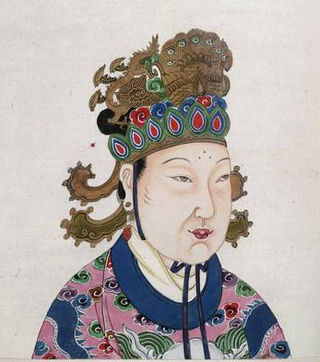
Wu Zetian, personal name Wu Zhao, was the first and only female emperor in Chinese history, and de facto ruler of the Tang dynasty from 665 to 705, ruling first through others and then in her own right. From 665 to 690, she was first empress consort of the Tang dynasty and then, after his death, empress dowager. Unprecedented in Chinese history, she subsequently founded and ruled as female emperor of the Wu Zhou dynasty of China from 690 to 705. She was the only female sovereign in the history of China widely regarded as legitimate. Under her 40-year reign, China grew larger, becoming one of the great powers of the world, its culture and economy were revitalized, and corruption in the court was reduced. She was removed from power in a coup and died a few months later.
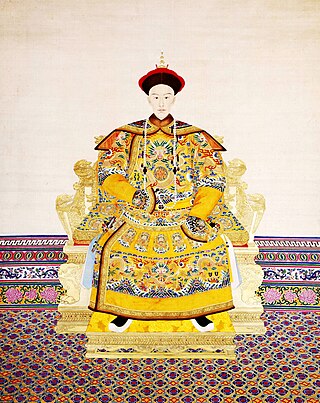
The Guangxu Emperor, temple name Emperor Dezong of Qing, was the tenth emperor of the Qing dynasty, and the ninth Qing emperor to rule over China proper. His reign lasted from 1875 to 1908, but in practice he ruled, without his aunt Empress Dowager Cixi's influence, only from 1889 to 1898. He initiated the Hundred Days' Reform, but was abruptly stopped when the empress dowager launched a coup in 1898, after which he became powerless and was held under house arrest until his death by poisoning. His era name, 光緒; 'Guangxu', means "glorious succession".

Emperor Jing of Han was the sixth emperor of the Chinese Han dynasty from 157 to 141 BC. His reign saw the limiting of the power of the feudal kings/princes which resulted in the Rebellion of the Seven States in 154 BC. Emperor Jing managed to crush the revolt and princes were thereafter denied rights to appoint ministers for their fiefs. This move helped to consolidate central power which paved the way for the long reign of his son Emperor Wu of Han.

Emperor Cheng of Han was an emperor of the Chinese Han dynasty ruling from 33 until 7 BC. He succeeded his father Emperor Yuan of Han. Under Emperor Cheng, the Han dynasty continued its growing disintegration as the emperor's maternal relatives from the Wang clan increased their grip on the levers of power and on governmental affairs as encouraged by the previous emperor. Corruption and greedy officials continued to plague the government and, as a result, rebellions broke out throughout the country. Emperor Cheng died childless after a reign of 26 years. He was succeeded by his nephew Emperor Ai of Han.

Emperor Ai of Han, name Liu Xin, was an emperor of the Chinese Han dynasty. He ascended the throne when he was 20, having been made heir by his childless uncle Emperor Cheng, and he reigned from 7 to 1 BC.
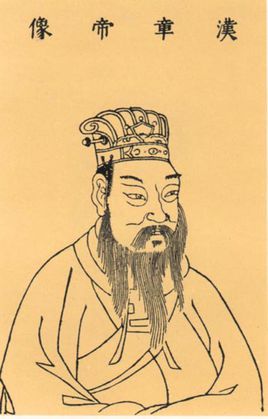
Emperor Zhang of Han, born Liu Da (劉炟), was an emperor of the Chinese Han dynasty from 75 to 88. He was the third emperor of the Eastern Han.
Emperor Huan of Han was the 27th emperor of the Han dynasty after he was enthroned by the Empress Dowager and her brother Liang Ji on 1 August 146. He was a great-grandson of Emperor Zhang. He was the 11th Emperor of the Eastern Han Dynasty.
Empress Wang of Jing, also known by her birth name Wang Zhi (王娡) and by her title Lady Wang, was an empress during the Han dynasty. She was the second wife of Emperor Jing and the mother of Emperor Wu. She was also the first known empress of China who was previously married to another man before becoming empress.
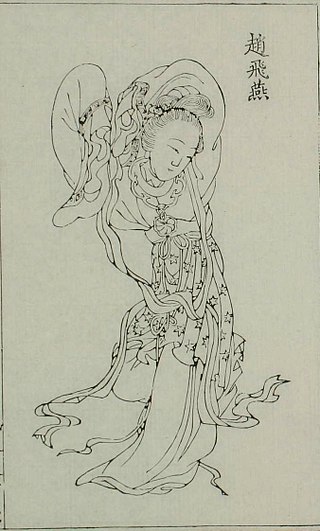
Zhao Feiyan, formally Empress Xiaocheng (孝成皇后), was an empress during the Han Dynasty. Her husband was Emperor Cheng. She was known in the Chinese popular mindset more for her beauty than for the palace intrigue that she and her sister, the also beautiful Consort Zhao Hede engaged in, but unlike most of the famous beauties in Chinese history, she was often vilified by her own sisters. She was often compared and contrasted with Yang Guifei, the beautiful concubine of Emperor Xuanzong of Tang, because she was known for her slender build while Yang was known for her full build. This led to the Chinese idiom huanfei yanshou, which describes the range of the types of beauties. Later, the idiom was also used as a figurative expression on literary styles that can be either verbose or sparse, but were equally effective.
Empress Ma, formally Empress Mingde, was an empress during the Eastern Han Dynasty from 8 April 60 until 75, then empress dowager from that year till her death. Her husband was Emperor Ming of Han.
Deng Sui, formally Empress Hexi, was regent of the Eastern Han dynasty from 106 to 121, serving as empress dowager during the reigns of Emperor Shang and Emperor An. A patron of scholarship and the arts, Deng successfully guided the dynasty through a period fraught with natural disasters and military conflict with the Xiongnu and Qiang. Her administration is considered one of the last periods of stable and effective rule during the Eastern Han dynasty, with subsequent rulers drawn into power struggles that gradually destabilized the empire. Prior to assuming the regency, Deng was consort and then empress to Emperor He.
Lady Bian, also known as Empress Dowager Bian or Grand Empress Dowager Bian, formally known as Empress Wuxuan, was an empress dowager and later grand empress dowager of the state of Cao Wei during the Three Kingdoms period of China. She was the wife of Cao Cao, a warlord who rose to power in the late Eastern Han dynasty and laid the foundation of Wei. She bore Cao Cao's successor, Cao Pi, who ended the Han Dynasty and founded Wei in 220 after his father's death.

Maria Theresa of Naples and Sicily was the first Empress of Austria and last Holy Roman Empress as the spouse of Francis II. She was born a Princess of Naples as the eldest daughter of King Ferdinand I of the Two Sicilies and Queen Maria Carolina.
Shen Wuhua dharma name Guanyin, was an empress consort of the Chen dynasty of China. Her husband was Chen Shubao, the last emperor of the dynasty.
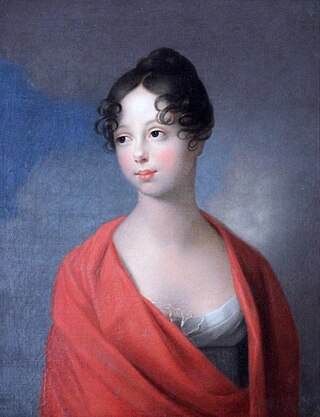
Grand Duchess Catherine Pavlovna of Russia later Queen Catharina Pavlovna of Württemberg, was the fourth daughter of Emperor Paul I of Russia and Duchess Sophie Dorothea of Württemberg. She became the Queen of Württemberg upon her marriage to her first cousin Crown Prince William who eventually became King William I of Württemberg in 1816.
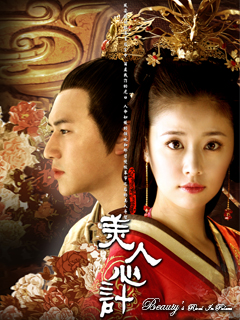
Beauty's Rival in Palace is a 2010 Chinese television series adapted from Xiao Qiying's short story Turbulence in the Empress' Chamber (未央沉浮). It was first broadcast on Shanghai TV Drama on 15 March 2010. The series was one of the highest-rated Chinese TV series in 2010.
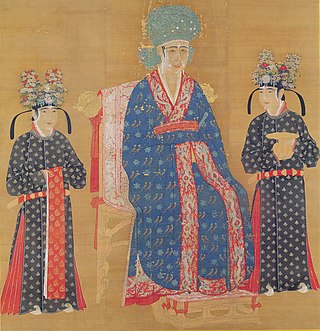
Empress Cao was a Chinese empress consort of the Song dynasty, married to Emperor Renzong of Song. She served as regent of China during the illness of Emperor Yingzong, from 1063 until 1064.

Li Fengniang was a Chinese empress consort of the Song Dynasty, married to Emperor Guangzong of Song. She is known as the de facto ruler of the Song dynasty Empire during the reign of her spouse.
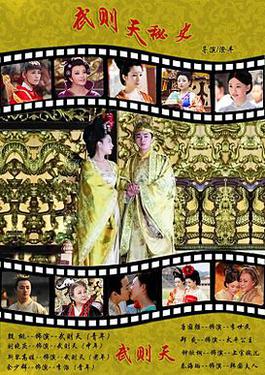
Secret History of Empress Wu, also known as Wu Zetian Mishi, is a Chinese television series based on the life of Wu Zetian, the only woman in Chinese history to assume the title of Empress Regnant. The series was directed by Cheng Feng and starred three actresses — Yin Tao, Liu Xiaoqing and Siqin Gaowa — as Wu Zetian, each playing the empress at a different stage of her life. It was first broadcast in mainland China on Hunan Satellite TV on 5 November 2011.
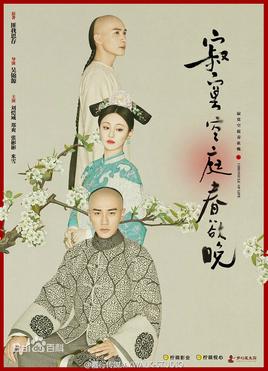
Chronicle of Life is a 2016 Chinese television series starring Hawick Lau, Zheng Shuang and Vin Zhang. It is based on the Chinese novel Lonely Courtyard in Late Spring by Fei Wo Si Cun. The series aired on Zhejiang Television and Shenzhen Television from 1 February to 23 February 2016.













